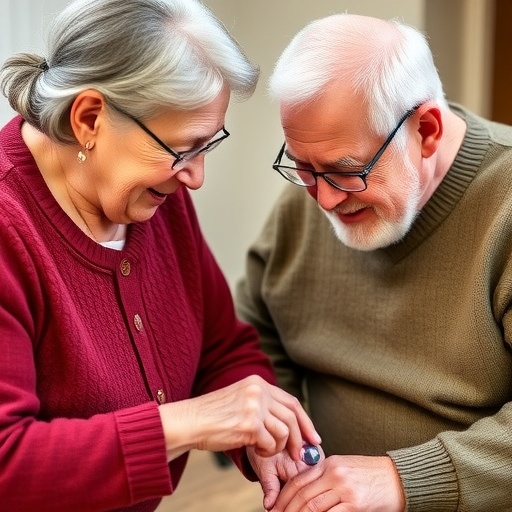In a groundbreaking study aimed at improving post-acute care for elderly patients, researchers have identified a new method to predict dyspnea following pulmonary embolism. This study, published in BMC Geriatrics, highlights the vulnerabilities that older adults face when recovering from acute pulmonary embolism, a condition that can severely impact respiratory function. The research introduces the Vulnerable Elders Survey-13 (VES-13), a tool believed to be more effective than the commonly used Simplified Pulmonary Embolism Score (SPEI) in forecasting the short-term respiratory challenges faced by this demographic.
The necessity for such a study stems from the alarming prevalence of pulmonary embolism in older populations. This often complex condition arises when a blood clot travels to the lungs, which can be life-threatening. Many elderly patients who survive this acute event deal with ongoing respiratory issues, including dyspnea (shortness of breath). Traditional risk assessment tools have proven inadequate in accurately predicting which patients are likely to experience these debilitating symptoms upon recovery.
Within this study, Imiela and colleagues conducted an extensive investigation that compared the effectiveness of the VES-13 against the SPEI. The VES-13 is a scale designed specifically to assess the overall vulnerability of elderly individuals, taking into account factors like functional status, cognitive decline, and social support. In contrast, the SPEI primarily focuses on clinical parameters related to pulmonary embolism, such as heart rate and blood pressure. The findings suggest that integrating social and functional assessments may yield a more holistic and predictive tool for managing risks in older patients.
The research methodology was thorough, involving a cohort of elderly survivors who had been hospitalized for acute pulmonary embolism. Participants were assessed using both the VES-13 and the SPEI, followed by evaluations of their post-embolism recovery, specifically monitoring for the emergence of dyspnea. The outcome measures demonstrated a significant correlation between high VES-13 scores and increased instances of respiratory complications, reinforcing the scale’s predictive value.
One of the critical implications of this research is the shift in how healthcare providers might approach the assessment of elderly patients recovering from pulmonary embolism. Traditional methods typically focus on immediate clinical signs, which may overlook the broader context of the patient’s life. The introduction of the VES-13 signals a potential paradigm shift towards a more comprehensive approach to elderly patient care, one that values the interplay between physical health and social determinants.
Healthcare systems worldwide may need to reevaluate their protocols in light of these findings. By adopting the VES-13 in routine assessments, practitioners could better identify at-risk patients and provide tailored interventions that address not only their physical health needs but also their psychosocial contexts. This shift can ultimately lead to improved patient outcomes and a reduction in the healthcare burden associated with complications of pulmonary embolism.
Moreover, the study paves the way for future research aimed at enhancing post-acute care strategies for the elderly. The focus on emotional and social aspects of health is a growing trend in geriatric medicine, and this research underscores its importance. Further studies utilizing the VES-13 could explore its effectiveness in other post-acute scenarios where elderly patients face complex recovery challenges.
There is also an urgent need to disseminate these findings among healthcare practitioners to ensure that the adopted practices reflect the latest evidence. Workshops, training sessions, and updated clinical guidelines could facilitate the integration of the new scale into everyday practice. As healthcare professionals become more aware of the interconnectedness of physical and emotional health in the elderly, a new standard of patient-centered care could emerge.
Patients and caregivers must also be included in discussions around these findings. Empowering patients by informing them about the importance of monitoring their condition and recognizing signs of dyspnea and other complications could foster greater engagement in their recovery. The involvement of families in the care process can enhance support structures, ultimately leading to better health outcomes.
In summary, the study presents a compelling argument for adopting the Vulnerable Elders Survey-13 as a superior method for assessing risk in elderly patients following acute pulmonary embolism. By highlighting the challenges faced by this population, the research offers insights into extending life quality post-acute events. As the medical community absorbs these findings, there is hope that new, innovative practices will emerge, revolutionizing care for vulnerable elderly populations.
As this discussion unfolds, researchers and healthcare leaders are encouraged to explore how these findings can impact policy-making at institutional and governmental levels. The future of geriatric care may depend on our ability to integrate such assessments into routine practice. With continued research, education, and advocacy, we can aim for a healthcare system that not only treats but also understands and respects the complexities of aging within the context of critical health events like pulmonary embolism.
In the evolving landscape of geriatric medicine, the work of Imiela and colleagues stands as a crucial contribution. Their study not only addresses a significant gap in pulmonary embolism care but also emphasizes a critical perspective on how we can enhance the lives of elderly patients through informed, empathetic, and tailored healthcare strategies.
Subject of Research: Predicting post-pulmonary embolism dyspnea in elderly survivors.
Article Title: The vulnerable elders Survey-13 scale is superior to the simplified pulmonary embolism score index in predicting post-pulmonary embolism dyspnea in elderly survivors of acute pulmonary embolism.
Article References:
Imiela, A.M., Kozak-Szkopek, E., Kurnicka, K. et al. The vulnerable elders Survey-13 scale is superior to the simplified pulmonary embolism score index in predicting post-pulmonary embolism dyspnea in elderly survivors of acute pulmonary embolism.
BMC Geriatr 25, 918 (2025). https://doi.org/10.1186/s12877-025-06580-7
Image Credits: AI Generated
DOI: https://doi.org/10.1186/s12877-025-06580-7
Keywords: Vulnerable Elders Survey-13, pulmonary embolism, dyspnea, elderly care, healthcare assessments.




